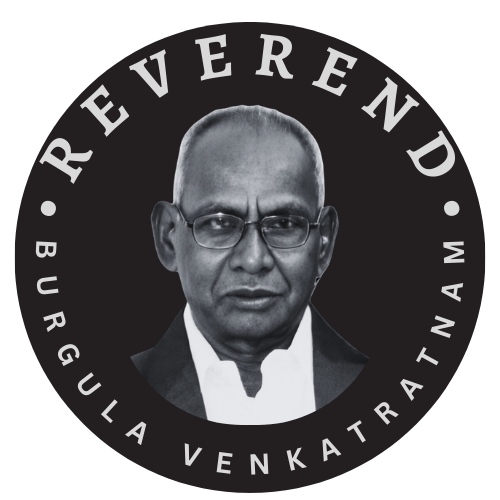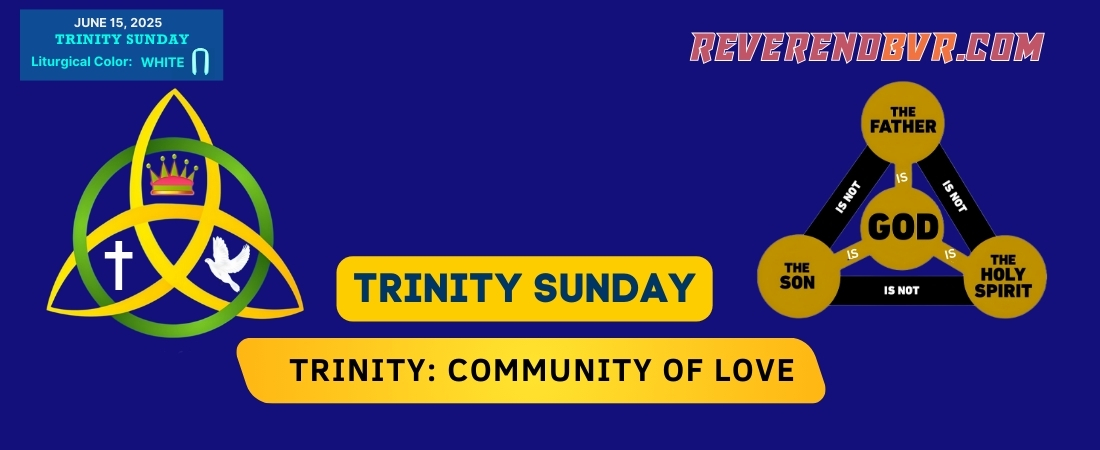On Trinity Sunday, we celebrate not a puzzle to be solved but a mystery to be lived — the Triune God who is a community of love: Father, Son, and Holy Spirit. As we are drawn into this divine fellowship, we are called to reflect God’s unity, self-giving, and joy in our fragmented world.
Sermon Title: Trinity: Community of Love.
Occasion: 1st Sunday after Pentecost | June 15, 2025, Sunday.
Textual Foundations: Genesis 18:1–15; Psalm 97; 2 Corinthians 13:5–14 and Mark 1:1–11.
Original Language Reflections (For deeper study, see Section 7 in the sermon): שְׁלשָׁה אֲנָשִׁים (sheloshah anashim) אָדוֹ ן (Adonai)| Τριάς (Trias) | Ἰησοῦς (Iēsous) | Πνεῦμα (Pneuma) | Φωνή (Phōnē)| Υἱός (Huios) | ἀγαπάω (Agapaō)
Website: www.reverendbvr.com
Verse for Meditation: “May the grace of the Lord Jesus Christ, and the love of God, and the fellowship of the Holy Spirit be with you all.”
(2 Corinthians 13:14)
Introduction: Living in the Mystery of God’s Love
On this Trinity Sunday, we step into the sacred mystery of God as Three in One — not as a mere logical puzzle, but as an invitation into divine relationship. God is not isolated or aloof, but a living community of love: Father, Son, and Holy Spirit. The doctrine of the Trinity is not an abstract theological theory; it is the very heartbeat of Christian faith and life. At the foundation of all reality is fellowship, self-giving, and love.
1. Biblical Foundations of the Trinity: Old and New Testaments
A. Trinity Foreshadowed in the Old Testament : While the word “Trinity” does not appear in the Old Testament, profound hints and whispers of this mystery are present:
- Genesis 1:26 — “Let us make man in our image.”
The plural language hints at a plurality within the divine unity. - Genesis 18:1–15 — Abraham encounters three visitors (שְׁלשָׁה אֲנָשִׁים — sheloshah anashim) yet addresses them as one Lord (Adonai). The narrative alternates between singular and plural forms, suggesting unity within plurality.
- The Spirit at Creation (Genesis 1:2) — “The Spirit of God was hovering over the waters.” The Spirit is active at creation, distinct yet fully divine.
- Prophetic glimpses (Isaiah 61:1; Joel 2:28) — These texts point toward the coming Messiah and the outpouring of the Spirit:
- “The Spirit of the Lord GOD is upon me…” (Isaiah 61:1)
- “I will pour out my Spirit on all flesh…” (Joel 2:28).
In both narrative and prophecy, the Old Testament speaks in shadows and whispers of the Trinity.
B. Trinity Revealed in the New Testament : The New Testament shines a bright light on the mystery:
- Mark 1:9–11 — At Jesus’ baptism, the fullness of the Trinity is revealed:
Jesus (Iēsous) stands in the waters, the Spirit (Pneuma) descends like a dove, and the Father’s voice (Phōnē) declares, “You are my Son (Huios), whom I love (Agapaō); with you I am well pleased.” - John 14:16–17 — Jesus promises to send the Spirit from the Father, revealing the cooperation within the Godhead.
- Matthew 28:19 — Jesus commands baptism “in the name of the Father, and of the Son, and of the Holy Spirit.”
- 2 Corinthians 13:14 — Paul offers a blessing invoking the triune grace, love, and fellowship.
The Trinity is not a later invention but is woven into the very fabric of Scripture, both in story and in worship.
2. Theological Development: Understanding the Trinity Through History
Through the centuries, the Church, guided by the Spirit, gradually articulated the mystery entrusted to her. Key moments include:
| S. No | Historical Moment | Key Development | Figures Involved |
| 1 | Early Church (2nd century) | Use of Trias (Greek) for God’s threefold nature | Theophilus of Antioch |
| 2 | 3rd century | Latin term Trinitas coined | Tertullian |
| 3 | Council of Nicaea (AD 325) | Affirmed Christ’s full divinity (homoousios — same essence) | Athanasius |
| 4 | Council of Constantinople (AD 381) | Affirmed the full divinity of the Holy Spirit | Gregory of Nazianzus |
| 5 | Nicene Creed (Finalized 381) | Formal statement of Trinitarian belief for the universal Church | Church Fathers |
| 6 | Reformation (16th century) | Clarified the role of the Trinity in salvation and Christian life | John Calvin |
Faced with heresies like Arianism, which denied Christ’s full divinity, the Church boldly proclaimed: “We believe in one God, the Father Almighty… and in one Lord Jesus Christ… and in the Holy Spirit.” Thus, the Trinity remains the faith of the one, holy, catholic, and apostolic Church.
3. Living in the Community of Love: Application for Today
A. Trinity as Model for Christian Community: The Trinity teaches us that relationship is at the very core of reality. In a fragmented world marked by loneliness, competition, and division, we are called to reflect God’s divine community:
- Unity without uniformity — Just as Father, Son, and Spirit are distinct yet one.
- Self-giving love — As Christ gave Himself for us, we are called to live sacrificially.
- Joyful fellowship — The Spirit binds us together with joy and peace.
Christian community is meant to be a living icon of the Trinity.
B. Trinity as Strength for Life’s Challenges: Life brings suffering, injustice, and uncertainty. Yet:
- The love of the Father reminds us we are never abandoned.
- The grace of Christ assures us we are forgiven and redeemed.
- The fellowship of the Spirit empowers us daily, especially in our weakness.
Thus, Trinity Sunday is not merely a theological feast — it is a summons to live more deeply into God’s own life: trusting the Father’s providence, following the Son’s example, and walking by the Spirit’s guidance.
4. Biblical Table: Trinity in Scripture
| S.No | Aspect | Scriptural Reference | Note |
| 1 | Three Visitors to Abraham | Genesis 18:1–15 | Suggests unity in plurality |
| 2 | Spirit at Creation | Genesis 1:2 | Spirit active in creation |
| 3 | Baptism of Jesus | Mark 1:9–11 | Father, Son, and Spirit manifest |
| 4 | Great Commission | Matthew 28:19 | Baptism into Triune name |
| 5 | Paul’s Trinitarian Blessing | 2 Corinthians 13:14 | Invocation of grace, love, fellowship |
| 6 | Teaching on the Holy Spirit | John 14:16–17 | Spirit sent by the Father, through the Son |
5. Conclusion: Living in the Community of Love
The Triune God — Father, Son, and Holy Spirit — is a perfect communion of love. From eternity, God is not isolated but relational. By grace, we are invited into that divine fellowship. As Jesus prayed: “That they may all be one, just as You, Father, are in Me, and I in You.” (John 17:21), Through Christ, by the Spirit, we are called to reflect the unity, love, and joy of God’s own life.
Therefore, let us become living signs of the Trinity — reflections of divine love in a fragmented world, bearing witness to the unity, mercy, and joy of our God. Glory be to the Father, and to the Son, and to the Holy Spirit. Amen.
6. Closing Prayer
O Blessed Trinity, Eternal Community of Love,
We praise You, Father, for creating us. We thank You, Son, for redeeming us. We rejoice in You, Holy Spirit, for sustaining us. Draw us ever deeper into Your perfect fellowship, that we may love as You love, serve as You serve, and rejoice as You rejoice. Heal our divisions, renew our hearts, and send us forth to bear witness to Your love. May we live this day and all our days in the grace of Christ, the love of the Father, and the fellowship of the Holy Spirit. Amen.
7. Learn Words from the Original Scriptures (For deeper understanding and meditation on today’s theme):
| S.No | Term– Click on each term to view its lexical details | Language | Meaning |
| 1 | שְׁלשָׁה אֲנָשִׁים (sheloshah anashim) | Hebrew | “three men” (for שְׁלשָׁה sheloshah = “three”) + “men” (anashim = “men”) — (Genesis 18) |
| 2 | Adonai (אָדוֹן) | Hebrew | “Lord” |
| 3 | Trias (Τριάς) | Greek | “Triad” or “Trinity” – used in early Christian theology (e.g., Theophilus of Antioch) |
| 4 | Iēsous (Ἰησοῦς) | Greek | “Jesus” |
| 5 | Pneuma (Πνεῦμα) | Greek | “Spirit” or “Breath” |
| 6 | Phōnē (Φωνή) | Greek | “Voice” |
| 7 | Huios (Υἱός) | Greek | “Son” |
| 8 | Agapaō (ἀγαπάω) | Greek | “To love” (verb form) |
Bibliography
- Augustine, De Trinitate (On the Trinity), trans. Edmund Hill, 1991.
- Athanasius, On the Incarnation, trans. John Behr, 2011.
- J.N.D. Kelly, Early Christian Doctrines, 5th ed., 1978.
- Alister E. McGrath, Christian Theology: An Introduction, 6th ed., Wiley-Blackwell, 2017.
- Thomas F. Torrance, The Christian Doctrine of God: One Being Three Persons, T&T Clark, 1996.
- The Nicene Creed (AD 381), in The Creeds of Christendom, ed. Philip Schaff.
© 2025 ReverendBVR.com | High-Academic Sermon Series, 2025.
Content licensed under Creative Commons Attribution-NonCommercial-NoDerivatives 4.0 International (CC BY-NC-ND 4.0). You are free to share — copy and redistribute the material in any medium or format with proper attribution. No commercial use or modifications allowed without explicit permission.
For further sermons and biblical reflections, please visit 🌐 www.reverendbvr.com/sermons

